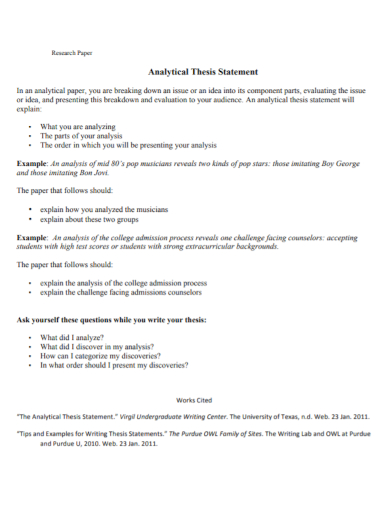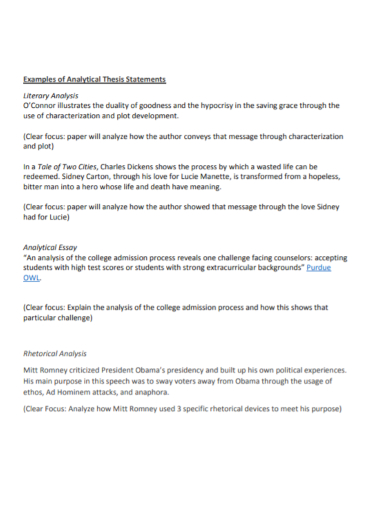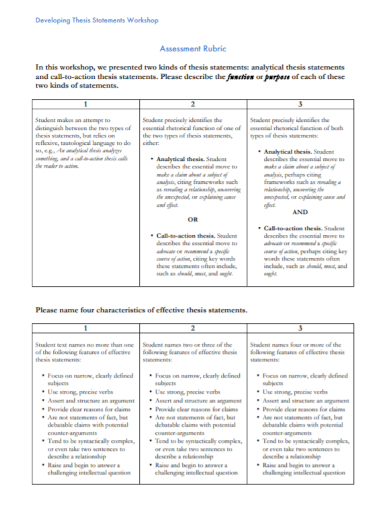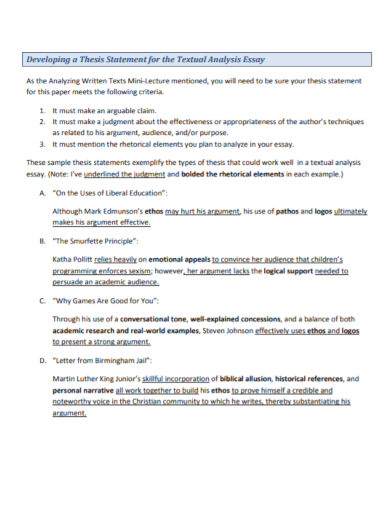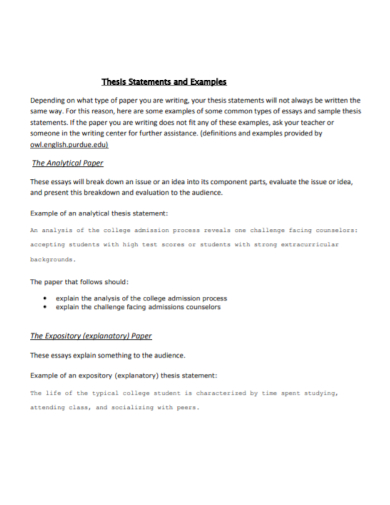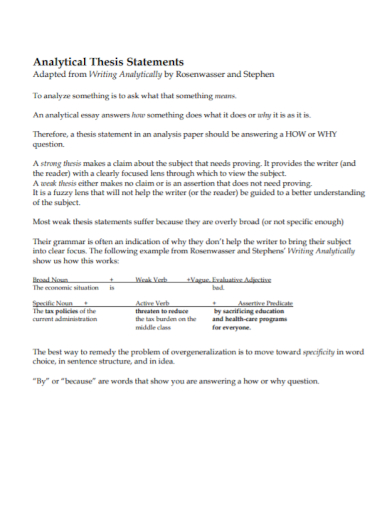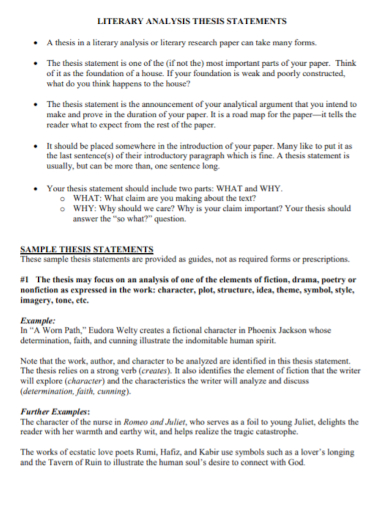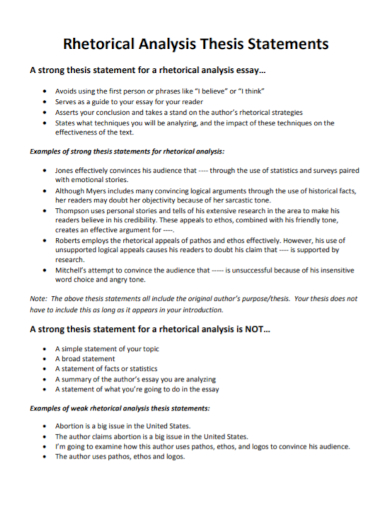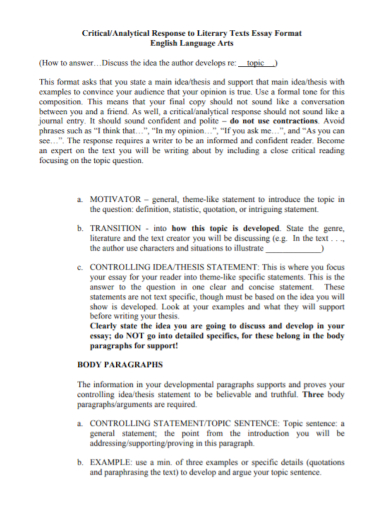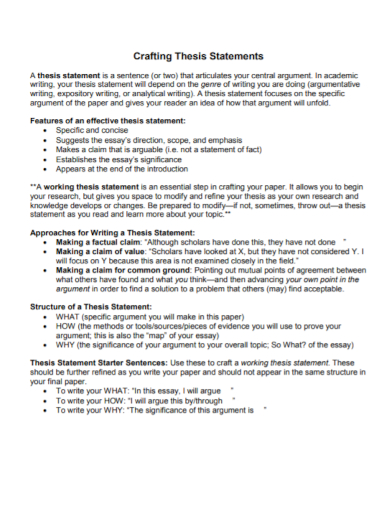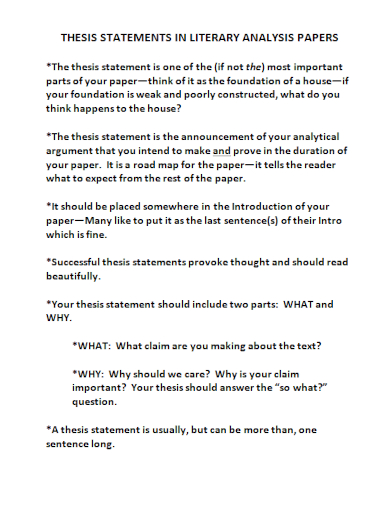One of the most common types of thesis statements for a research proposal or paper is an analytical thesis statement wherein it evaluates the foregoing research study and gives light to what it really means and its underlying message. It usually answers the questions “how” and “why” of the paper that will lead the viewers to the takeaways of what defining the problem statement may result. Thus, writing this kind of thesis statement does not only require a good understanding of the subject matter but also a reliable skill in technical writing.
If you’re still struggling to start yourself, try downloading our free Analytical Thesis Statement Samples on this page to help you start. Keep reading to improve your skill.
10+ Analytical Thesis Statement Samples
1. Analytical Research Thesis Statement
2. Essay Analytical Thesis Statement
3. Workshop Analytical Thesis Statement
4. Textual Analysis Essay Thesis Statement
5. Analytical Paper Thesis Statement
6. Analytical Explanatory Thesis Statement
7. Literary Analysis Thesis Statement
8. Rhetorical Analysis Thesis Statement
9. Critical Analytical Thesis Statement
10. Analytical Crafting Thesis Statement
11. Literary Analysis Paper Thesis Statement
How to write an Effective Analytical Thesis Statement
How does one go about writing an analytical statement? What are the important points that need to be taken note of to write an effective thesis statement?
1. Writing your content
The very first thing to consider when writing your thesis statement is to carefully outline your content and what you should and should not include in it. Thesis statements should be original opinions on something and are not similar to those that are generally accepted and is possibly true only to the paper you are working on. It shows where you stand as the researcher or the writer and it presents your unique subject and point of view of the topic. A research paper outline can be the basis for your analytical thesis statement because it contains the important details of your paper which you will discuss in your thesis statement.
Your argument should be presented clearly and completely so that complex ideas will be understood based on logical and sound reasoning. Thus, it justifies your whole research paper and that the topic that you have chosen has importance and relevance to those directly involved with the results and implementation of the paper.
2. Establish a reliable and comfortable tone
The tone of your analytical thesis statement should give an impression that you know what you’re doing while not being too overbearing and strong. Simply state your facts and don’t try too hard to convince your audience.
Your thesis statement should also be written to point out an idea that is specific and not general, possibly only referring to your subject matter and nothing else. Hence, it requires an accurate detailing of your concept map and ideas and should avoid ambiguities. It is also important to use words that don’t have multiple meanings and if it cannot be avoided, these words must be used in a sentence that reveals their true meaning.
3. Location and length
At what part you place and how long you make your thesis statement are also significant in making sure that it can effectively reach out to your readers. Thesis statements are usually one to two sentences in length and the number of its words depends on its depth and message. If it is located at the beginning of the paragraph, it should serve as a welcoming message to your readers that will also serve as a topic sentence of the paragraph. In this way, it guides the readers throughout so that they will be redirected whenever they get lost and overwhelmed by the length or complexity of ideas presented.
If the thesis statement is placed in the middle or at the end of the paragraph, the beginning of the paragraph may require a strong introductory statement, like an introductory speech, just enough to stir the readers’ interest but not too overwhelming that the thesis statement will be upstaged. With just one to two sentences, you should be able to state all the necessary depth, tone, explanation, and rationale of your thesis statement. It should be noted that being word doesn’t make it sound very ethically professional and credible. In fact, it will only confuse your readers and may lead them to infer other bodies of ideas that diverge from what you actually mean.
FAQs
What does subject matter mean in research writing?
It is the idea or topic that is given a thorough discussion to understand its purpose and functionality.
What is a discrete variable?
A variable in research methods that is only measured in whole numbers such as age and population.
What is a field study?
A research study conducted in the natural environment rather than in laboratories and other controlled environments.
Communicating the facts and your stand in your thesis statement generally relies on the structure of your sentence and your choice of words. Writing itself can be quite daunting and to become effective, one needs to be exposed to writing activities or practice on their own. Most importantly, a seasoned researcher or writer should know first what they are writing by heart so that communicating it through writing will not be that difficult to do.
Related Posts
FREE 10+ Marketing Problem Statement Samples [ Strategy, Digital, Social Media ]
FREE 10+ Medical Problem Statement Samples [ Surgical, Nursing, Management ]
FREE 10+ Payoff Statement Samples in PDF | DOC
FREE 10+ Scholarship Statement of Purpose Samples in PDF | DOC
FREE 10+ Engineering Problem Statement Samples [ Software, Mechanical, Civil ]
FREE 30+ Information Statement Samples in PDF | MS Word
FREE 50+ Policy Statement Samples in MS Word | Google Docs | PDF
FREE 50+ Summary Statement Samples in PDF | MS Word
FREE 10+ Nursing School Personal Statement in PDF
FREE 9+ Mortgage Statement Samples and Templates in PDF
FREE 10+ Independent Subcontractor Statement Samples in MS Word | Google Docs | Apple Pages | PDF
FREE 10+ Trust Distribution Statement Samples in PDF
FREE 14+ Compliance Statement Samples & Templates in PDF | MS Word
FREE 10+ Extension Impact Statement Samples in PDF | DOC
FREE 10+ Bank Reconciliation Statement Samples and Templates in PDF | MS Word

